Myth vs. Reality in Parenting: What’s True and What’s Not?
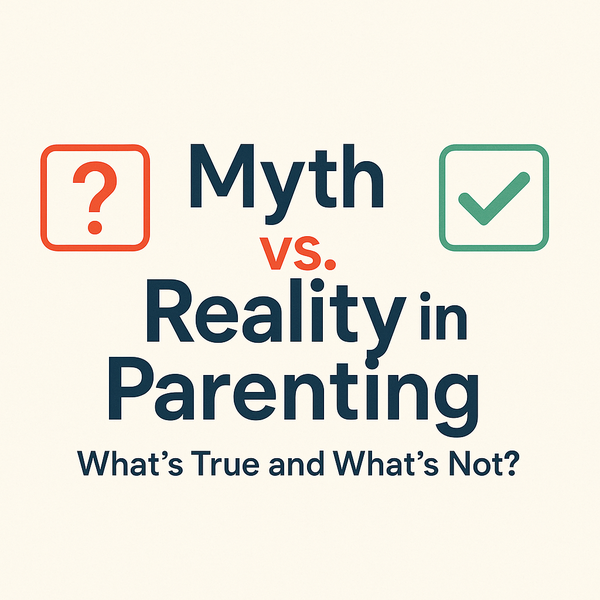
Explore the truth behind common parenting myths. Learn what’s real and what’s just a misconception when it comes to raising healthy, happy children. Read on for expert advice!
Introduction: Navigating the Noise - Why Parenting Myths Persist and How to Find Clarity
I remember scrolling through my phone at 3 a.m., my newborn finally asleep on my chest, and feeling a wave of panic wash over me. One article said I should never let him sleep on me. Another said it was the only way to build a secure attachment. My mom told me I was spoiling him, while a blogger I followed swore by co-sleeping. It felt like I was drowning in a sea of conflicting advice, and every choice I made felt wrong.
If this sounds familiar, you're not alone. Modern parents are bombarded with information from every direction—grandparents, news headlines, and picture-perfect influencers. It’s a constant barrage that breeds anxiety and guilt, making us feel like we're failing at the most important job in the world. Many of these 'rules' are just myths, outdated ideas passed down without any real evidence to back them up. But they have a real impact on our mental health.
This guide is for you. It’s a life raft in that sea of noise. We’re going to cut through the confusion, bust the most common parenting myths, and replace them with the confidence that comes from understanding what science and child development experts actually say. The goal isn't to find the one 'right' way to parent—it's to give you the knowledge to make the best decisions for your family, turning that anxiety into calm, confident action. It's time we started saying goodbye to outdated parenting trends.
Part 1: The Foundation - Myths About the Very Nature of Parenting
Before we get into the nitty-gritty of sleep or discipline, let's talk about the big, foundational myths that shape how we see ourselves as parents. These are the beliefs that cause the deepest stress, creating a shaky foundation for everything else.
Myth 1: Good parenting should come naturally
Have you ever felt like a fraud because parenting didn't just "click"? There's this pervasive myth that parenting is an instinct we're all born with. The truth is, while we have protective instincts, raising a human in the modern world is a learned skill. No one is born knowing how to teach emotional regulation or navigate the digital world. Thinking about parenting with purpose is a skill we develop over time.
This "natural parent" myth is especially tough on mothers. Society often assumes women are biologically programmed to be perfect caregivers, which is simply not true. It creates a deep sense of shame that can stop moms from asking for help when they're struggling with postpartum depression or just the sheer exhaustion of it all. It also lets fathers and the wider community off the hook from their essential role in raising a child.
Myth 2: You must be a perfect, all-knowing, and constantly "on" parent
Let's be clear: the perfect parent is a ghost. They don't exist. It's not only okay to feel lost and make mistakes—it's normal. One of the greatest gifts we can give our children is showing them the "courage to be imperfect." Kids are resilient. They aren't broken by our mistakes, as long as the foundation of our relationship is love, security, and our willingness to repair things when we mess up.
Chasing perfection can actually backfire. It can make us rigidly follow some "expert's" advice, even when our gut—and our child—is telling us it's not working. The goal isn't to be mistake-free, but to show our kids that mistakes are part of life and that saying "I'm sorry" is a superpower.
Myth 3: Good parents always put their children's needs first
This one sounds noble, but it's a recipe for burnout. Of course our children's needs are a top priority, but constantly sacrificing our own is harmful to everyone. Think of it like the airplane oxygen mask: you have to put yours on first before you can help anyone else. A parent's well-being isn't a luxury; it's the bedrock of a healthy parenting dynamic. When we're running on empty, we can't be the calm, patient parent our child needs.
Kids also need to know that we are in charge. It makes them feel safe. When their every whim is catered to, it can actually make them anxious because, deep down, they know they aren't equipped to run the family. Taking care of yourself isn't selfish; it's essential.
Myth 4: Your primary job is to make your child happy at all times
A child's happiness is a wonderful thing, but it's a terrible barometer for good parenting. Life is full of emotions—sadness, anger, frustration—and these aren't signs of failure. They are a normal, healthy part of being human. Our job isn't to shield our kids from every negative feeling, but to be their emotional coach, helping them navigate the entire spectrum of feelings.
The pressure to keep them happy can make us afraid to set limits. But saying "no" is how we teach resilience and self-control. When we meet their sadness or anger with love instead of trying to fix it, we send a powerful message: all of your feelings are welcome, and you are loved no matter what.
Myth 5: The parental partnership can be neglected while raising children
In the beautiful chaos of raising kids, it's so easy to let our relationship with our partner slide to the back burner. This is one of the biggest mistakes we can make. The partnership is the foundation of the family. Some experts even say it's the most important love in the home, because its stability creates the safe harbor where children thrive.
When we neglect our connection, it can become all about logistics and putting out fires. Our kids learn about relationships by watching us. If they see distance and conflict, that becomes their blueprint for love. Nurturing your partnership with small gestures, compliments, and dedicated time together isn't selfish. It's one of the greatest gifts you can give your child.
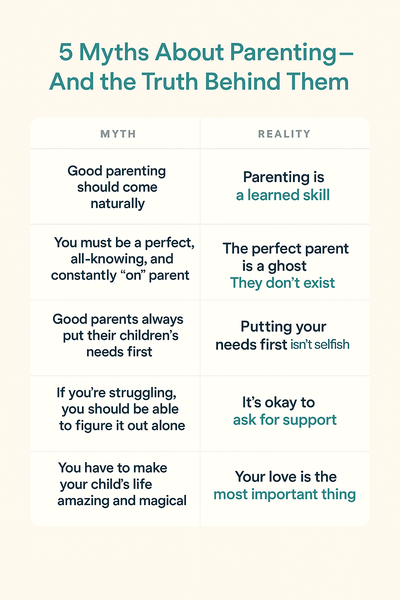
Part 2: The First Year - Debunking Myths About Newborns and Infants
That first year is a whirlwind of love, growth, and, let's be honest, a whole lot of anxiety. Much of that anxiety comes from myths about how to care for a tiny, fragile human. Let's clear the air so you can parent with more confidence and joy.
Myth 1: You can spoil a baby by holding or responding to them "too much"
If you've ever had a well-meaning relative tell you you're spoiling the baby by picking them up, you can officially ignore them. It is impossible to spoil a baby with too much love. When you cuddle, rock, or respond to your baby's cries, you're not creating a bad habit. You are building a secure attachment, which is the foundation for their emotional health for the rest of their life. You are teaching them that the world is a safe place where their needs will be met. This myth started in the 1920s, based on opinion, not science, and has been thoroughly debunked ever since. A securely attached baby grows into a confident, independent child.
Myth 2: Babies cry to manipulate you or to "exercise their lungs"
A baby's cry is not a scheme; it's a signal. Infants don't have the brainpower for manipulation. Crying is their only way to communicate a real need: "I'm hungry," "I'm in pain," "I'm lonely," "I'm scared." The idea that they cry to "exercise their lungs" is a dangerous old wives' tale with no basis in reality. Seeing a cry as manipulation is often our own frustration talking. It's a moment that calls for empathy, not a power struggle.
Myth 3: You should leave a baby to "cry it out" so they learn to self-soothe
This is a huge misunderstanding of child development. A baby who is left alone will eventually stop crying, but it's not because they've learned to self-soothe. It's because they've learned that no one is coming. Their body is still flooded with stress hormones; they've simply given up. The ability to self-soothe is a complex skill that develops over years, built on a foundation of "co-regulation"—thousands of moments where you calmed them down. That's what wires their brain for future independence.
Myth 4: Newborns need to be bathed every day
Daily baths can actually do more harm than good for a newborn's delicate skin, stripping away natural oils and leading to dryness and irritation. A full bath is only needed a few times a week. On other days, a gentle wipe-down of their face, neck, hands, and diaper area is perfectly fine. And remember to stick to sponge baths until that little umbilical cord stump falls off on its own.
Myth 5: A baby's first smiles are just gas
Don't let anyone take this magical moment from you! While we can't know exactly what a newborn is thinking, those early smiles are a vital part of social bonding. Babies are born to mimic our expressions. When you smile at them, they reflect it back. Soon, they learn that their smile brings a loving response from you, and they start doing it on purpose to connect. That's not gas—that's the beginning of a beautiful conversation.
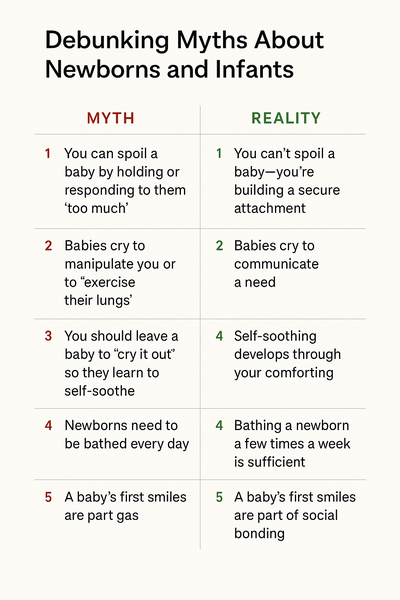
Part 3: The Quest for Sleep - Separating Sleep Science from Fiction
Is there any topic that causes more parental angst than sleep? We're pressured to have a "good sleeper," but the advice is a minefield of myths. Let's get to the truth, so everyone in the family can get some rest. For a complete overview, check out this ultimate guide to baby sleep.
Myth 1: Babies should sleep through the night by a certain age (e.g., 3 or 6 months)
This expectation is completely at odds with infant biology. Waking up at night is normal for babies. Their sleep cycles are much shorter than ours (only about 45-50 minutes), and they often need our help to drift back to sleep between cycles. "Sleeping through the night" is a developmental milestone, like walking or talking, and every child gets there on their own timeline. For many, it's closer to a year or even later. The pressure to hit this milestone early only leads to frustration and feelings of failure.
Myth 2: Putting a baby to sleep on their stomach is better for comfort or gas
This is a dangerously false myth. Health organizations worldwide are unanimous: babies must be placed on their backs for every sleep until they are one year old. This single practice has dramatically reduced the rates of SIDS. The anatomy actually works in their favor on their back; the windpipe is positioned above the esophagus, so gravity helps keep any spit-up down and away from their airway. Supervised "tummy time" while they're awake is vital, but sleep must always be on the back in a crib free of soft items.
Myth 3: Sleep training is inherently harmful and damages attachment
"Sleep training" has become a loaded term, often unfairly equated with leaving a baby to cry alone. In reality, sleep coaching is a wide spectrum of approaches, from very gentle, parent-present methods to more structured checks. A huge body of research has found that behavioral sleep coaching does not harm the parent-child bond. The goal is to gently guide a child toward the life skill of falling asleep independently. Chronic sleep deprivation in parents is a serious health issue, and it can be more damaging to the family bond than the temporary tears that might come with learning a new skill.
Myth 4: Keeping a baby awake longer during the day will make them sleep better at night
This seems logical, but it's the opposite of how babies work. An overtired baby isn't a sleepy baby; they're a "wired" baby. When they're pushed past their limit, their bodies produce stress hormones like cortisol and adrenaline, which act like caffeine. This makes it harder for them to fall asleep and stay asleep. Good daytime naps aren't the enemy of nighttime sleep; they are essential for it.
Myth 5: "Sleep regressions" are predictable developmental leaps that disrupt sleep
The idea of predictable sleep regressions at 4, 8, and 12 months is more of a pop-parenting concept than a scientific fact. While sleep is definitely disrupted by milestones, teething, or illness, research hasn't found that these happen at predetermined times for all babies. The "four-month regression," for example, is actually a permanent progression to a more mature sleep pattern. Labeling every hiccup as a regression can cause needless anxiety. Sometimes, the real issue is a schedule that needs tweaking or a sleep habit that's no longer working. Understanding the importance of sleep for children's health is the first step.
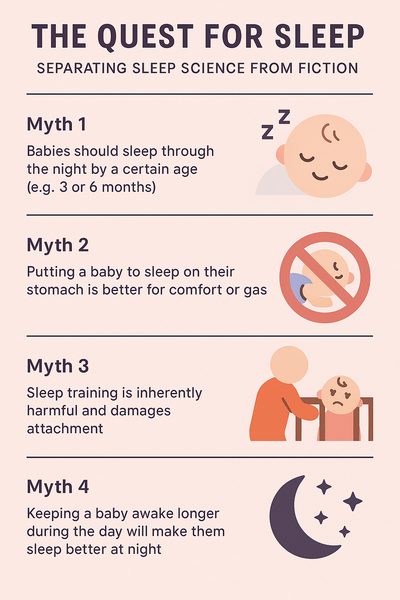
Part 4: The Fuel for Growth - Unraveling Feeding and Nutrition Myths
From the first spoonful of puree to the picky toddler years, feeding our kids can feel like a high-stakes mission. But mealtimes don't have to be a battleground. With a little myth-busting, we can help our children build a happy, healthy relationship with food. For personalized advice, you might even explore tools like a nutrition AI.
Myth 1: Sugar makes children hyperactive
We've all seen it: the post-cake frenzy at a birthday party. But dozens of studies have shown that sugar itself doesn't cause hyperactivity. The real culprit? The super-stimulating environment of the party! Our own expectations also play a huge role; when parents think their child has had sugar, they rate their behavior as more hyper. While sugar isn't a direct cause of hyperactivity, it's still wise to offer it in moderation for overall health and to avoid the energy crash that can affect attention spans later.
Myth 2: Infant cereal must be a baby's first solid food
This is a cultural tradition, not a medical rule. There's no reason you can't start with pureed avocado, sweet potato, or even meat. The most important nutrient to focus on around six months is iron, as a baby's natural stores start to deplete. So whether you choose iron-fortified cereal, pureed red meat, or beans, just make sure iron is on the menu.
Myth 3: You must choose between spoon-feeding and baby-led weaning (BLW)
This is a false choice! You don't have to pick a side in the "mommy wars." A hybrid approach is often the best of both worlds. It lets your baby explore textures and practice self-feeding (a benefit of BLW) while also ensuring they get a wide variety of foods and iron-rich purees that can be harder to self-feed. Follow your baby's lead and do what works for your family.
Myth 4: If a child is hungry enough, they will eventually eat what's offered
This "tough love" approach can backfire, especially for kids with sensory issues or extreme picky eating. For these children, certain foods aren't just "disliked"—they can feel genuinely threatening. They will often choose to go hungry rather than eat something that triggers an overwhelming negative response. Turning meals into a battle of wills creates stress, suppresses appetite, and damages the trust between you and your child.
Myth 5: It's not appropriate for children to play with their food
For a toddler, squishing, smearing, and smelling food is not misbehavior—it's research! It's how they learn about the properties of food before it ever touches their tongue. Eating is an incredibly complex sensory task. Allowing them this "play with a purpose" is a crucial part of them learning to accept new foods. Manners can be taught later, after a positive relationship with eating is established.
Myth 6: Picky eating is just a behavioral problem that needs to be corrected
Picky eating is a normal, frustrating, but very common developmental stage. The best strategy is patient, low-pressure exposure. It can take 20 or more times of seeing a food on their plate before they'll even try it. Try the "75-25 rule": make 75% of their plate familiar "safe" foods, and 25% a new "learning" food, with no pressure to eat it. This ensures they get enough nutrition while still being exposed to new things. For great ideas, you can find many kid-friendly recipes or even learn some nutrition hacks for picky eaters.
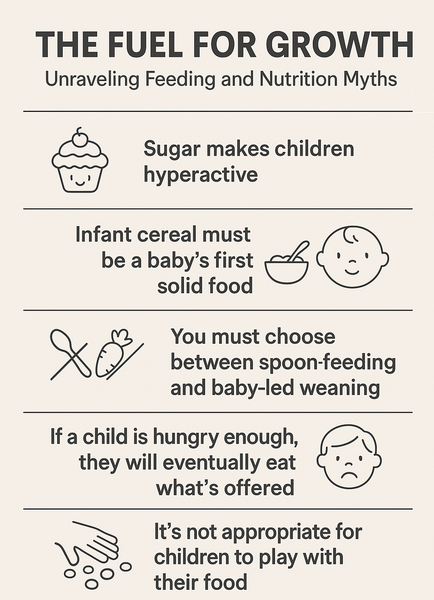
Part 5: Guidance Over Punishment - The Truth About Discipline
The word "discipline" makes many of us think of punishment. But its true meaning is "to teach." To guide our children effectively, we need to shift our mindset from punishment to teaching, from fear to connection.
Myth 1: "Spare the rod, spoil the child" - Physical punishment is an effective discipline tool
This is one of the most dangerous myths, and it is unequivocally false. Major medical and psychological organizations worldwide have condemned all forms of physical punishment. Decades of research show it's linked to increased aggression, mental health problems, and antisocial behavior in the long run. It doesn't teach self-control; it teaches that violence is a way to solve problems and that fear is the basis of relationships.
Myth 2: Punishment and discipline are the same thing
This is a critical distinction. Punishment is about making a child suffer for a misdeed. Discipline is about teaching them the skills to make better choices in the future. Punishment is reactive and focuses on the short term. Discipline is proactive and focuses on the long-term goal of helping a child develop their own internal moral compass. There are many positive discipline strategies that work far better than punishment.
Myth 3: Saying "no" will damage a child's self-esteem
In our desire to move away from overly strict parenting, a new myth has emerged that setting limits is harmful. The opposite is true. Firm, loving boundaries are essential. They teach self-control and frustration tolerance. Children feel safer and more secure when they know the rules and trust that we will keep them safe. The key is how we say no—calmly and with empathy, as an act of protection, not anger.
Myth 4: Misbehaving children are being intentionally manipulative
Young children don't have the brainpower for premeditated manipulation. What we see as manipulation is usually a learned behavior that we, the parents, accidentally reinforced. For example, a child learns that throwing a tantrum is the fastest way to get our undivided attention. Their goal isn't control; it's connection. Instead of asking, "Why are they manipulating me?" we should ask, "What does this behavior tell me they need right now?"
Myth 5: Explaining why a behavior is wrong is enough to change it
Long lectures don't work, especially in the heat of the moment. While explaining the "why" behind rules is important for building their moral compass, there's a huge gap between knowing something is wrong and having the skill to act differently when emotions are high. The teaching happens best when a child is calm. It involves connecting with them first, then modeling, practicing, and using tools like logical consequences, not just explaining. Understanding different parenting styles can help you find the right approach.

Part 6: Modern Parenthood - Navigating Development in a Digital Age
Raising kids today comes with a whole new set of challenges our parents never dreamed of. From screens to social media pressure, we have to apply timeless principles to a brand-new world.
Myth 1: All screen time is "bad" for young children
The conversation has thankfully moved beyond just how long kids are on screens to the quality of what they're watching. While excessive, passive screen time isn't great, not all screen use is "bad." The biggest negative effects are linked to having a TV on in the background, which distracts both parent and child from crucial interactions. On the other hand, watching high-quality educational content with your child, talking about it, and connecting it to the real world can be beneficial. The key is co-viewing, not just consumption. It's a dilemma every parent faces.
Myth 2: Educational apps and shows are a valid substitute for interactive learning
No app can replace real-world, hands-on, human interaction. Young children learn best by exploring their physical world and having "serve and return" conversations with the people who love them. A child's brain has a hard time transferring what it learns on a 2D screen to the 3D world. "Educational" is often just a marketing term; nothing is more educational than a conversation with you.
Myth 3: All children should be crawling, walking, or talking by a specific, rigid age
Developmental milestone charts are a guide, not a deadline. They represent an average range, and every child develops at their own unique pace. It's even normal for some babies to skip crawling altogether! These charts have become a huge source of anxiety in the age of social media comparison. Their real purpose is to help pediatricians identify the small number of children who might benefit from early intervention. If you have a gut feeling something is wrong, trust it and talk to your doctor, but try not to stress about the calendar. You can learn more from a guide to developmental milestones.
Myth 4: Assigning chores to young children is inappropriate and puts too much pressure on them
Giving young children simple, age-appropriate chores is actually incredibly good for them. Tasks like putting toys in a bin or helping set the table make them feel capable, needed, and like a contributing member of the family team. It's one of the best ways to teach responsibility and cooperation. The key is to frame it not as a task to be rewarded, but as something "we" do as a family to take care of our home and each other.
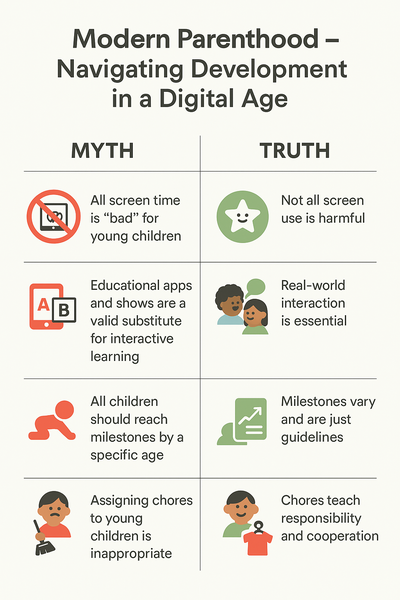
Conclusion: Parenting with Confidence - Embracing Imperfection and Evidence
The journey of parenting isn't about finding a secret formula or being perfect. It's about one thing: building a strong, secure, and loving relationship with your child. That relationship is the foundation for everything else.
This means letting go of the myths that cause so much guilt and anxiety. The goal isn't to be a "perfect" parent, but a "good enough" one. A good enough parent is responsive and attuned most of the time, but also makes mistakes and gets frustrated. And, crucially, they are willing to repair the connection with love and honesty. This dance of connection, disconnection, and repair is what builds resilience in both you and your child.
By arming yourself with evidence instead of fear, you can learn to trust your own informed intuition. You can parent with a quieter confidence, knowing you are focused on what truly matters. The goal isn't just to raise well-behaved kids, but to nurture human beings who are secure, compassionate, and ready to navigate life with strength and kindness. For more tips and insights, keep exploring and learning on your journey.
Sourced used in this blog :
Myth-busting: Screen-time - Speech and Language UK: Changing young lives
Myths and Facts about Newborn and Premature: A Complete Guide - Medanta Hospital5 Myths About Parenting - The Timothy Center
We bust sleep myths for you! - Millpond
Baby Sleep 101: 6 Myths About Infant Sleep Debunked - Magnolia Birth house
6 Popular Myths About Children's Sleep | Marc Weissbluth
What are some common myths about parenting that lead to unrealistic expectations for new parents? - Quora
The Mainstream Parenting Myths We Need to Forget - Happiness is here
Understanding Discipline Myths - Mount Sinai - Parenting Center

Comments
No comments yet. Be the first to leave a comment!